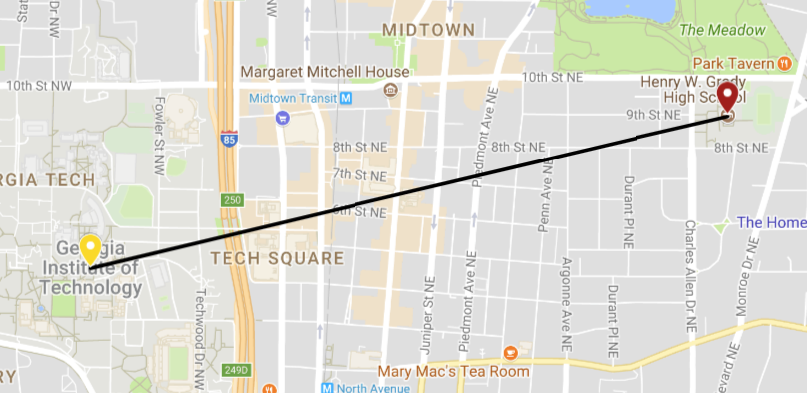
Chandler is Managing Editor of the Southerner Online as well as Asst. Managing News Editor of the Southerner. She specializes in news, features, and...


October 24, 2017
The shooting of student Scout Schultz on Atlanta’s Georgia Tech campus sparked debate and outrage over the actions of Georgia Tech police officers.
Some, however, have classified Schultz’s case as a mental health crisis on the campus, bringing calls for reform to mental health services and training regarding mental health for campus officers. Georgia Tech is less than two miles west of Grady on 10th Street in Midtown. Many Grady alumni currently attend the school.
Schultz, a Georgia Tech student, was shot and killed by a campus security officer in September after calling the police to report a white male, fitting Schultz’s description, wielding a knife. This death was attributed to both excessive police force and Shultz’s ongoing battle with mental health issues. Schutz reportedly left behind multiple suicide notes.
According to the Georgia Tech counseling center, the full-time counseling staff is made up of 15 counselors for 21,884 students. Georgia Tech students are offered a maximum of 16 counseling sessions at mental health services over their four year-tenure before they must seek counseling elsewhere, which can become expensive.
Current and former Georgia Tech students have complained about this system, which limits treatment.
According to Landry Bennett, a current Georgia Tech employee and alumnus, there is a two-to-three month wait for an appointment at the psychiatry clinic. Students are often referred to off-campus professionals who may not be close to the campus or covered by insurance.
“Personally, I was already dealing with my depression through therapy before I came to Georgia Tech, but the stress during my time at Tech caused me to seek medical care, in addition to my therapy,” Bennett said. “Tech has to step up to the plate on this issue. You cannot create an environment ripe for mental illness to grow and then, in turn, not provide students with the necessary resources to combat mental illness.”
Some are calling for Tech to reform its allocation of resources to provide for a more efficient counseling system. Since Georgia Tech is a public university, it receives funding from the state to provide these services. Georgia Tech professor Dr. Jennifer Glass said the resources are not enough for the counseling department.
“I think the counseling department is trying their hardest to provide necessary services; I just don’t think they have the resources they need to do so,” Dr. Glass said. “I think we need change; we need students to be advocates for themselves and other students and just be proactive about their own health.”
Another component of mental health on campus brought to the public eye, in wake of Schultz’s death, is the training of campus security officers. Georgia Tech officers are not required to go through crisis intervention training before they are on duty, although the training is offered throughout the state of Georgia.
Georgia, however, does not require state universities by law to equip their security with this training and has little-to-no requirements for mental health services on campus and campus police officers are not required to go through mental health training.
Mental health policy is an issue not only in universities, but also in public schools. Mental health is handled by school social workers; however, students are sent to off-campus mental health services to receive counseling.
Grady’s social worker, Adelia Johnson, is responsible for recognizing behavior that demonstrates mental health issues and advocating for students with mental health issues. According to Johnson, school policy mandates that in an instance of a mental health crisis, she must contact the parent of the student or social services immediately.
“At large, in the Atlanta Public School population, we see a lot of depression, suicidal tendencies and anxiety,” Johnson said. “There are some agencies that will provide services if you don’t have insurance.”
Johnson added, “The only issue is that there isn’t enough funding for mental health agencies that want to provide free services, or there are other barriers such as location or the resources available through the mental health agency. I would say that [the state] could invest more in mental health services, definitely.”
Atlanta Public Schools, however, does train school faculty, including campus police officers, on awareness and dealing with mental health issues. According to Johnson, the entire school staff gets an intensive training on mental health protocol at the beginning of the year and APS police officers are required to take an eight-hour course on handling mental health issues.
These policies are required in high school settings, but usually do not extend to public universities.
“Generally, one-in-five adults and adolescents have a serious mental health issue,” Lisa McGarrie, a research associate at the Georgia Health Policy center,” Lisa McGarrie, a research associate at the Georgia Health Policy Center, said. “So, that data tell us that high school and college students are vulnerable to mental health issues. It also means that even if a young person is not dealing with a mental health issue his or herself, that he or she is likely to have a family member, friend or acquaintance dealing with these issues.”
For related coverage, please see:


Chandler is Managing Editor of the Southerner Online as well as Asst. Managing News Editor of the Southerner. She specializes in news, features, and...
Naiki Kaffezakis • Oct 24, 2017 at 6:03 pm
GT Student and Activist here. A couple of notes.
The students are really trying to step up and make a change. An example is the GT Progressive Student Alliance which was locked out of the process by President Peterson.
The million dollar endowment is supposed to come through the student government associations which has yet to pass it. It is meant solely for the mental health care. It actually amounts to less than 50k annually according to GT policy on endowment, which would barely cover the salary of one therapist.
Georgia Tech actually has 29,000 students (https://www.irp.gatech.edu/enrollment) and 7 of the 15 full time faculty left 2 weeks prior to Scout’s death in protest of the poor accommodations and resources provided to the counseling center. The press release was a clear fabrication to help diminish the problem.
The four action teams are designed to gather information and make a report on problem areas. President Peterson has final say on what happens after November 1st, and there is no form of accountability to guarantee action.
Georgia Tech has also broken precedent in the arrests after the protest in making 4 further arrests, targeting mostly black, mostly queer students (5 out of 7 arrested were POC, 5 out of 7 were LGBT , 6 out of 7 were students) on misdemeanor obstruction charges, something that is rarely done, especially 2 weeks after the event in question.
There is a lot more going on that Peterson and the University System of Georgia is trying to hide by making what seem like sweeping gestures. In a 1.8 billion dollar budget, 1 million is not enough. 100 million would allow for all the necessary programs to be funded. The action teams seem like they are meant to work, but there is a lot of silence on what happens after Nov. 1st.